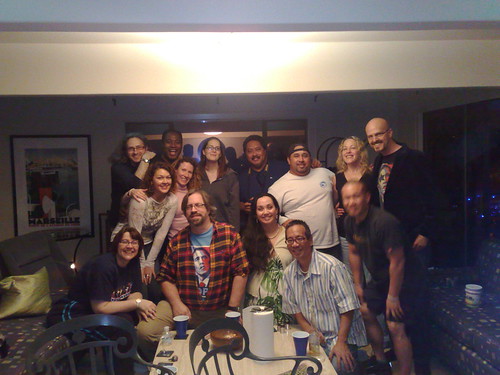 So, we’ve been back in England a few weeks. I’ve even had time to do my busiest week of masterclasses ever! (more on that later, I promise)
So, we’ve been back in England a few weeks. I’ve even had time to do my busiest week of masterclasses ever! (more on that later, I promise)
For now, it’s time to round up some of the lessons and tips from our house-concert-based, social-media-driven jaunt to the US over christmas/january.
A few salient points to start with:
- most of the gigs were booked by people we know via Twitter.
- all but one of the gigs were house concerts.
- we did 5 masterclasses – 3 in houses, one in a pub, one in a Uni.
- in 7 weeks, we spent 2 nights in hotels, which we didn’t pay for anyway.
- we made more money per gig than we ever have playing clubs/coffee houses (read: we actually MADE money, net, after paying for everything.)
- we met more amazing people on this trip than ever before.
- very few of the people at the gigs could have named a single other solo bassist.
- moreso, very few of the people who came to the shows had heard OF us before, let alone HEARD us. Media exposure was not a prerequisite for attendance.
- we have about 5 hours of video to pick through of the shows.
- we have invites back for twice as many gigs as we played.
- nobody got rich.
- nobody planned to get rich.
Let’s break these down:
Most Of The Gigs Were Booked By People We Know Via Twitter:
the usual method for getting gigs is something like; “google venues and promoters in an area >> email promoter or venue >> send package >> agree to do gig for door money >> minus commission >> with food included if you’re lucky >> book hotel nearby for somewhere to stay”. Add other steps if a) promoter has no idea who you are and wants to put you on a double bill with someone who’s a ‘name’. The upshot is, it can often take 3 or 4 gigs in an area before you make any money. After the show’s booked, you contact local press and radio, send CDs, bios etc, and hope they cover it, so people will hear you and then come to the gig. Sometimes this works. often, it doesn’t.
Method for our tour: “talk to lots of people on twitter >> make friends >> allow them to discover music as they get interested in who we are >> tell them we’re touring >> invite them to host gig >> Book in the dates” – the audience is a shoe-in, cos most people can fairly easily find 15-30 friends who are up for a crazy night of music making in a house. It’s a nuts idea, it’s fun, and it has the added benefit of being validated by a friend of their’s… if Tracy/Linda/Angela/Steve/Gus etc are willing to book this, it MUSTÂ be good. The person who books the show then emails the links to what we do around (no need to send out CDs) so people have an idea what to expect. Everyone comes to the gig, eats, listens, buys CDs, and we go home with money and loads of new friends. Win-Win.
All But One Of The Gigs Were House Concerts:
if we get offered non-house-concert gigs, we take them if they’re fantastic. They have to be AT least as good as house concerts to be worth doing. We’re no longer desperate for somewhere to play. The show we did at Grace Presbyterian church in Long Beach was an amazing night. And we got to see Vicki Genfan and Jim Bybee play too. Win-Win.
We Did 5 Masterclasses – 3 In Houses, One In A Pub, One In A Uni:
masterclasses in houses are great fun, and a fab way of a) sharing knowledge on tour and b) making a lil’ more cash. We did classes on looping, bass stuff and ‘social media for musicians’ – again, arranged by the people hosting the house concerts. I usually do a pretty big bass class in Northern California, and it has in the past paid for my entire trip. I didn’t need to this time, so was able to do a much smaller, more focussed class, for people experimenting with solo bass. Win-win.
In 7 Weeks, We Spent 2 Nights In Hotels, Which We Didn’t Pay For Anyway:
at each of the house concerts, we stayed in the house where the gig was. That’s not always the case with house concerts, but on this trip, it worked really well like that. In most places, we also had another day or so to hang out and see the area. The hotel nights were a thank you from Modulus for all the masterclasses and clinics I do using their instruments all over the place.
We Made More Money Per Gig Than We Ever Have Playing Clubs/Coffee Houses:
so much of what happens on tour is built on the promise of imagined success; ‘if you do *** then *** will surely happen’ but rarely is anyone willing to underwrite it to that degree, and so the artist takes a lot of the burden of risk… With house concerts, there’s no chance at all that you’re suddenly going to find yourself making millions of dollars. But there’s also less chance that you’re going to find yourself in debt and unable to pay the bills. The financial arrangements are generally straightforward, friendly, and sensible. Guarantees are kept at a level where they work for everyone.
We Met More Amazing People On This Trip Than Ever Before:
guess that speaks for itself. My music life is full of encounters with incredible, inspiring people. At house concerts we just get way more time to get to know them, to make friendships that will last. Ultimately, I’m WAY more interested in people than ‘success’. If I can combine encounters with magical people with a sustainable touring model, I’m happy. House concerts do just that. Win-win.
Very Few Of The People At The Gigs Could Have Named A Single Other Solo Bassist:
SO often gigs by bassists are largely populated by other bassists ogling their wikkid skillz and monster tech. As much as I love spending time with bassists, it changes the gig if they’re over-represented in an audience. Singers never have to play to entire audiences of singers. It’d be weird. So to play to rooms full of people who have little idea what looping is, don’t know any other solo bassists, and so are listening to what I do as music first and last is REALLY inspiring. I love it. It makes me a better musician.
Very Few Of The People Who Came To The Shows Had Heard OF Us Before, Let Alone HEARD Us. Media Exposure Was Not A Prerequisite For Attendance:
we had precisely ZERO mainstream media coverage for these gigs. No radio, no TV, no mags no nothing. At least partly because these are private events at people’s houses, and so we weren’t about to be giving the addresses out to total strangers. There are ways for people to get to the gigs if they contact us, but it’s not about broadcast at all. No, most of the audience were friends of the host, people brought in because the host said it was good, put their house and money behind it, and believed in what we did. It paid off. We had no shows that were less than wonderful. Made loads of new friends, and sold lots of CDs. Win-win.
We Have About 5 Hours Of Video To Pick Through Of The Shows:
the digital footprint of house concerts is probably about 10 times that of a normal gig. People are excited and talk about the show. Often the attendees are geeked-out, tweeting and facebooking the show from their iPhones and N95s, filming it, taking pics and posting them online, and in many cases, streaming it. The Milwaukee show has now had nearly 300 views on Ustream.tv. Everything is amplified.
Not only that, but after watching the Milwaukee show, we were invited to play in Philly. The show was booked because of the stream. Lovely Linda Mills saw the gig, sent me a twitter message, booked it, promoted it, and the show happened. All in about 3 weeks. Win-win.
We Have Invites Back For Twice As Many Gigs As We Played:
at house concerts, everyone there is a potential booker. they all have homes they live in, and may want to book a show. Loads of people went away inspired to book us next time we came, and also to start doing shows for their friends. That’s GREAT news.
Nobody Got Rich / Nobody Planned To Get Rich:
this is so far from being driven by the rock ‘n’ roll myths it’s untrue. No-one’s getting rich doing house concerts. But no-one’s doing it to try and get rich. It’s sustainable, people-centred, low-impact, high-value touring. It’s cheap to put on, flexible, engaging, original, exciting and artistically elastic. You can do the kind of show in a house you could never get away with in a club full of drinking punters expecting to dance. And you can go home making a profit, paying your bills, with time and resources to make more music for the next time you come round.
This tour was probably my favourite tour I’ve ever done. Every gig was more fun than playing the Royal Albert Hall. The people were amazing, the hosts were incredible in their generosity and still grateful to us for coming and playing. The audiences were attentive, engaged and loved it. There really was nothing bad about it at all.
Yesterday on Twitter, someone suggested that while my soundbites were enjoyable, the reality was different. (see the whole conversation here ) Our experience on tour says this works. Says it’s real. Says it will continue to work.
So, were you there? What did you think? Have you done house concerts? how did they go? please post your thoughts on house concerts/social media/the future of touring in the comments below…
(the picture at the top is of about half the audience/musicians who played at the inauguration house concert/party we co-hosted with Kerry Getz in Newport Beach – an amazing bunch of musicians, from all over the place, playing amazing music)
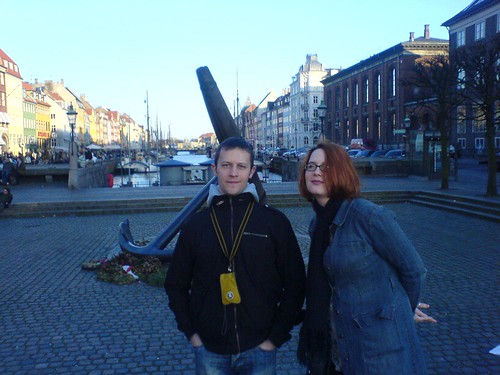 After he commented on the 10 great basslines post, I asked my Danish drummer friend, Anders Faerch, to list 10 great drum grooves to check out – here’s his list. Some great stuff in there!
After he commented on the 10 great basslines post, I asked my Danish drummer friend, Anders Faerch, to list 10 great drum grooves to check out – here’s his list. Some great stuff in there!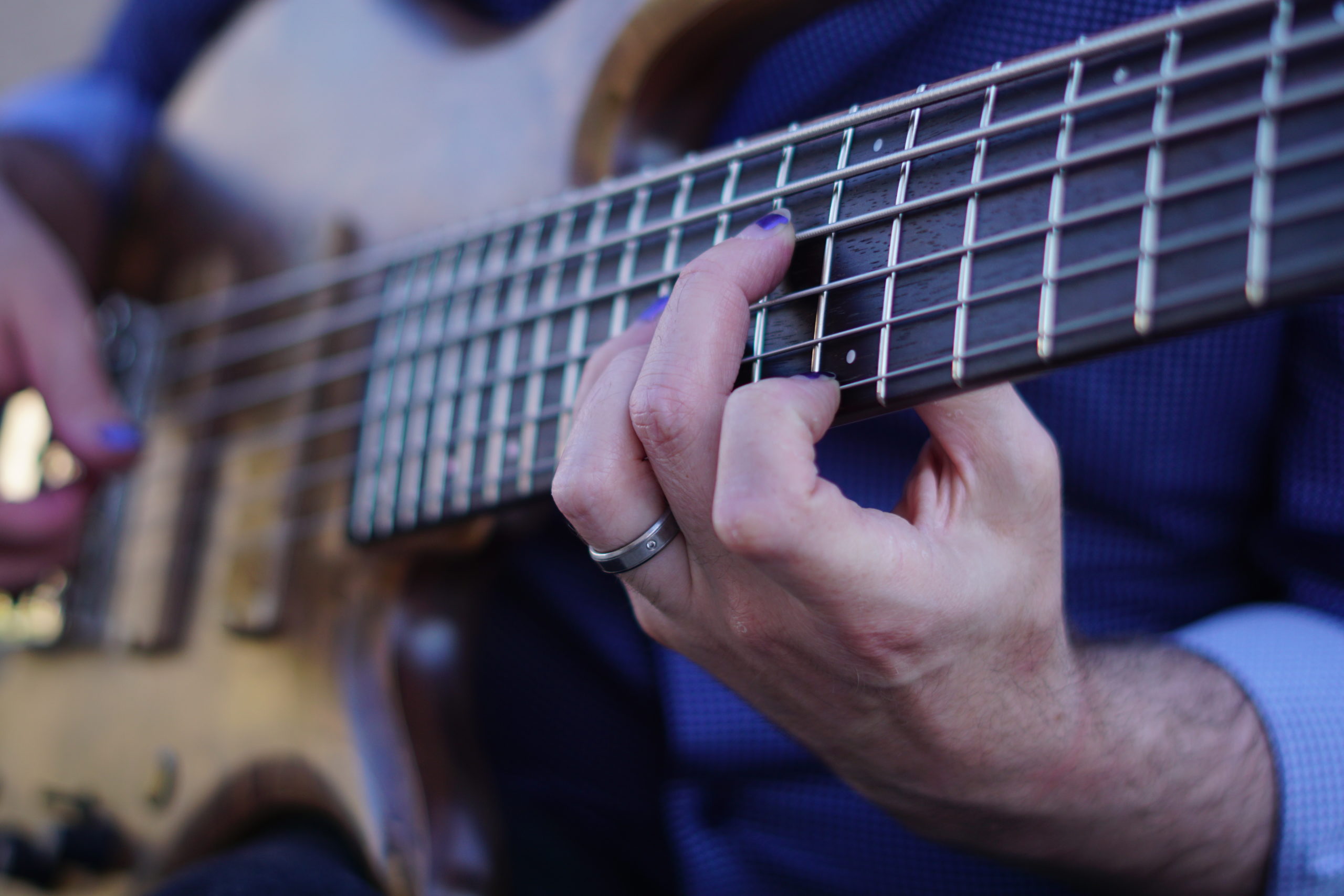
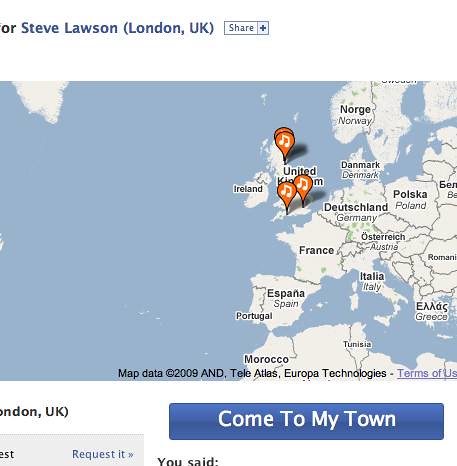
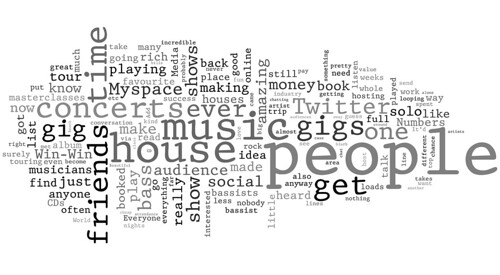

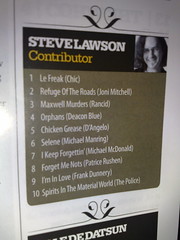
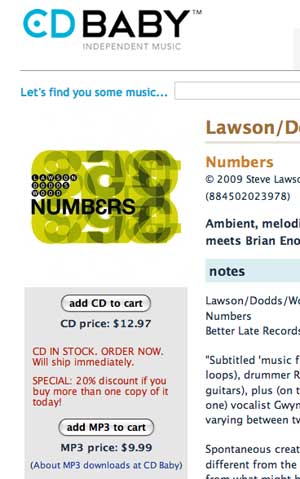
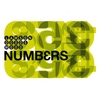
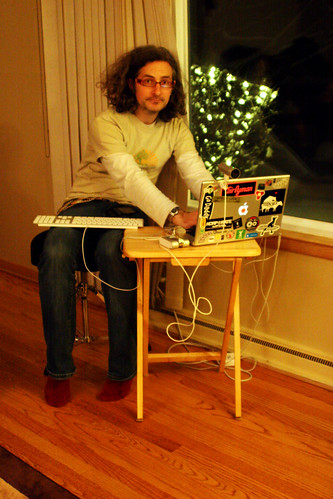 So, as I
So, as I 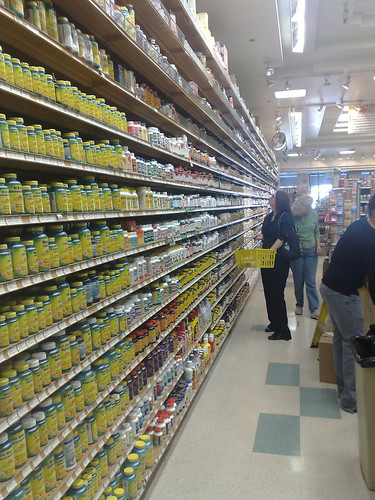 So, context: I’m on
So, context: I’m on 
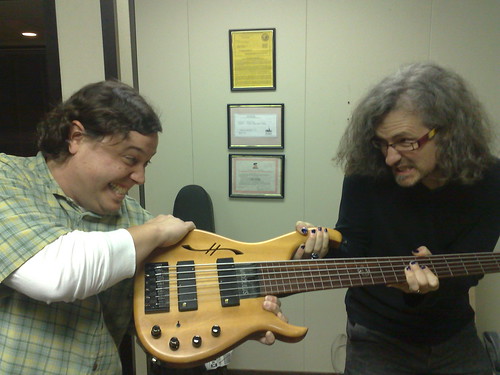 So, as you know, the saga so far is that
So, as you know, the saga so far is that 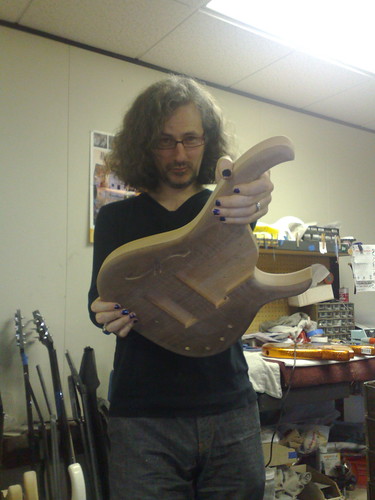 But then a Joe has a light-bulb moment, remembering that there was in fact a semi-hollow Q6 body that had a tiny blemish (I couldn’t even see it!) that meant it couldn’t be sold (their quality control is exceptional). I looked at it, and loved the idea…
But then a Joe has a light-bulb moment, remembering that there was in fact a semi-hollow Q6 body that had a tiny blemish (I couldn’t even see it!) that meant it couldn’t be sold (their quality control is exceptional). I looked at it, and loved the idea…